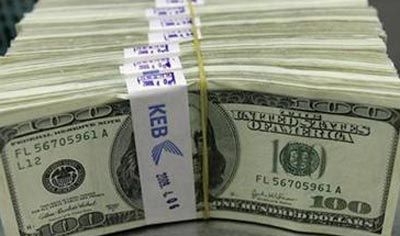Wednesday, 22 July 2015 23:19
 NEW YORK: The dollar rose on Wednesday after its biggest fall in a month the previous session, while sterling gained in response to minutes from the Bank of England’s last meeting that suggested some policymakers support higher interest rates.
NEW YORK: The dollar rose on Wednesday after its biggest fall in a month the previous session, while sterling gained in response to minutes from the Bank of England’s last meeting that suggested some policymakers support higher interest rates.
The yen held its ground against the dollar and strengthened against the euro after Bank of Japan Governor Haruhiko Kuroda on Tuesday said he expected inflation to accelerate and brushed off the idea of more monetary stimulus.
The currency market has been listless this week as Greece’s debt crisis has waned and traders ponder the timing of a Federal Reserve rate increase this year, analysts said.
“There’s not that much direction for the market,” said Charles St-Arnaud, currency strategist at Nomura Securities International in New York. “There’s a feel of dollar strength with commodity prices falling. There was some risk aversion overnight.”
The dollar index that gauges the greenback against a basket of currencies was up 0.5 percent at 97.765. It fell 0.71 percent on Tuesday, its biggest single-day fall since June 17, partly on poor US company results.
News home resales rose to a 8-1/2 year peak and propelled the greenback to session highs.
Weaker commodity prices also supported a mild rebound in the dollar. Crude prices fell 0.8 percent in London, while spot gold slid to a five-year low.
The British pound rose 0.3 percent at $ 1.5606. Against the euro, it gained 0.9 percent to 69.68 pence According to records from the Bank of England’s July 8 meeting, several policymakers are moving towards voting for the first rate increase following BOE Governor Mark Carney’s recent comments that a hike might happen around the end of year.
The notion of less monetary stimulus also bolstered the yen. On Tuesday, BoJ Governor Kuroda suggested no more quantitative easing would be needed given his view on inflation rising due to a tight labor market.
The yen slipped 0.2 percent percent versus the dollar at 124.09 yen, while the euro fell 0.4 percent at 134.93 yen.
Commodity currencies, including the Australian, New Zealand and Canadian dollar, which have been hit by the dollar’s rally in the past month, were still on the back foot. The kiwi fell 0.8 percent to $ 0.6572, a shade above six-year lows set last week, with focus turning to a Thursday meeting of the Reserve Bank of New Zealand that is expected to cut interest rates at least a quarter point.




























